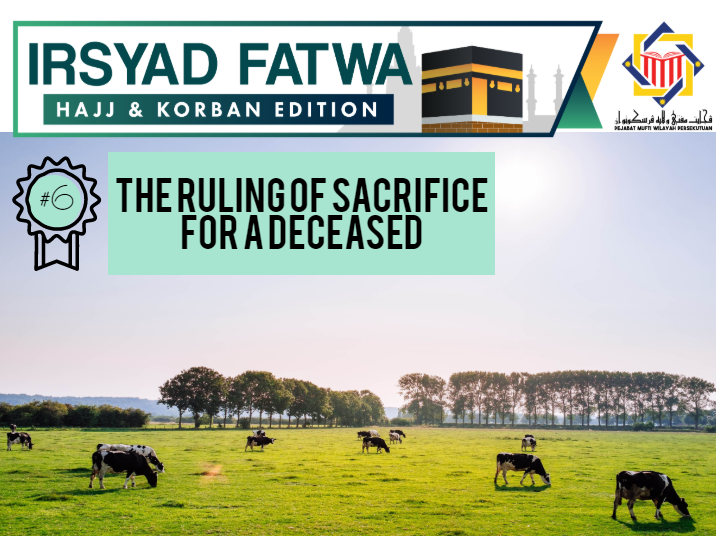Question:
Is it permissible for me to perform a sacrifice on behalf of a deceased?
Answer:
Alhamdulillah, praise and thanks to Allah for the countless blessings He has blessed us all with. Blessings and salutations to the Prophet Muhammad PBUH, his wives, his family, companions and all those that follow his teachings to the day of judgement.
There is a difference of opinions among scholars regarding this issue. In this issue, there are several opinions:
- First: It is permissible to perform a sacrifice on behalf of a deceased and the deceased will receive the rewards of it. This is the opinion of al-Hanafiyah, al-Malikiyyah, al-Hanabilah and some of al-Syafi’eyyah scholars.
This is in accordance with a hadith from ‘Aisyah R.Anha where it is narrated that the Prophet PBUH perform sacrifice and state:
بِاسْمِ اللَّهِ اللَّهُمَّ تَقَبَّلْ مِنْ مُحَمَّدٍ وَآلِ مُحَمَّدٍ وَمِنْ أُمَّةِ مُحَمَّدٍ
“In the name of Allah," O Allah, accept [this sacrifice] on behalf of Muhammad and the family of Muhammad and the Umma of Muhammad"
Sahih Muslim (1967) and others
It is generally known that among the ummah of the Prophet PBUH are also people who have passed away and the Prophet PBUH specifically designate that his sacrifice is for his ummah. Thus, it is evidence for the permissibility of performing a sacrifice on behalf of a deceased.
Al-Kasani Rahimahullah said: “From the aspect of istihsan, death is not a barrier for taqarrub. This is supported by the permissibility to donate and to perform hajj on behalf of a deceased and it is in accordance with the actions of the Prophet PBUH himself, where the Prophet PBUH sacrifices two goats; one for himself and the other for the ummah of the Prophet Muhammad PBUH who did not perform sacrifice for there are among the Prophet PBUH’s ummah who passed away before he had the chance to perform sacrifice. Thus, this shows that those who passed away are still able to taqarrub with it (through the worship of sacrifice)…” (See Bada’i al-Sana’i, 5/72)
Furthermore, Ibn ‘Abidin Rahimahullah said: “Whoever performs the worship of sacrifice on behalf of a deceased, perform it the same way as if he would perform the sacrifice for himself in terms of the distribution and taking (for eating) of the meat of the sacrifice. The rewards are for the deceased while the ownership is to the person performing the sacrifice.” (See Hasyiah Ibn ‘Abidin, 6/326)
Whereas, the Hanabilah scholars said: “The slaughter for the worship of sacrifice for a deceased is encouraged (in which) those who are alive to sacrifice for the deceased, for the deceased are in need of rewards and by performing this (slaughter), it also benefits the living in terms of as a source of food, donation and gift.”
- Second: It is makruh (undesirable) to sacrifice on behalf of a deceased. This is the opinion of al-Malikiyyah scholars. Al-Kharshi Rahimahullah said: “It is makruh for someone to perform the worship of sacrifice for a deceased to avoid riya’ (ostentatious/showing off) and the act itself is not from the Prophet PBUH and if it the money for it is not prepared by the deceased but if the deceased has left provisions for it, then it is permissible for the successor to perform sacrifice for him.” (See Syarh Mukhtasar al-Khalil, 3/42)
- Third: It is impermissible to perform a sacrifice for a deceased unless it is asked and stated by the deceased in his will before his death. This is the opinion of al-Syafi’eyyah scholars where al-Imam al-Nawawi Rahimahullah said: “It is impermissible to perform a sacrifice on behalf of others unless with permission from the person himself and this is applicable for a deceased where it is impermissible unless it is asked by the deceased before he passed away.” (See Minhaj al-Tolibin wa ‘Umdah al-Muftin fi al-Fiqh. Dar al-Fikr, pg. 321)
Conclusion
Although it is an issue where there are differing opinions from among the scholars, we are inclined towards the third opinion, where most Syafi’eyyah scholars state that in order for one to perform a sacrifice for a deceased, the deceased must have asked for it to be performed before he passed away.
However, we do not deny the opinion of some Syafi’eyyah scholars where they state that a request from the deceased is unnecessary. This is stated by Prof Dr Muhammad al-Zuhaili Hafizahullah: “(and it is said) the slaughter for a deceased is valid even if the deceased did not request for it, for it is considered the same as the validity of giving charity on behalf of a deceased where it will benefit the deceased.” (See al-Mu’tamad fi al-Fiqh al-Syafi’e. Dar al-Qalam, 2/490)
Hence, we hope that this issue could be understood clearly in accordance with Shari'a and fiqh. Wallahua’lam.


